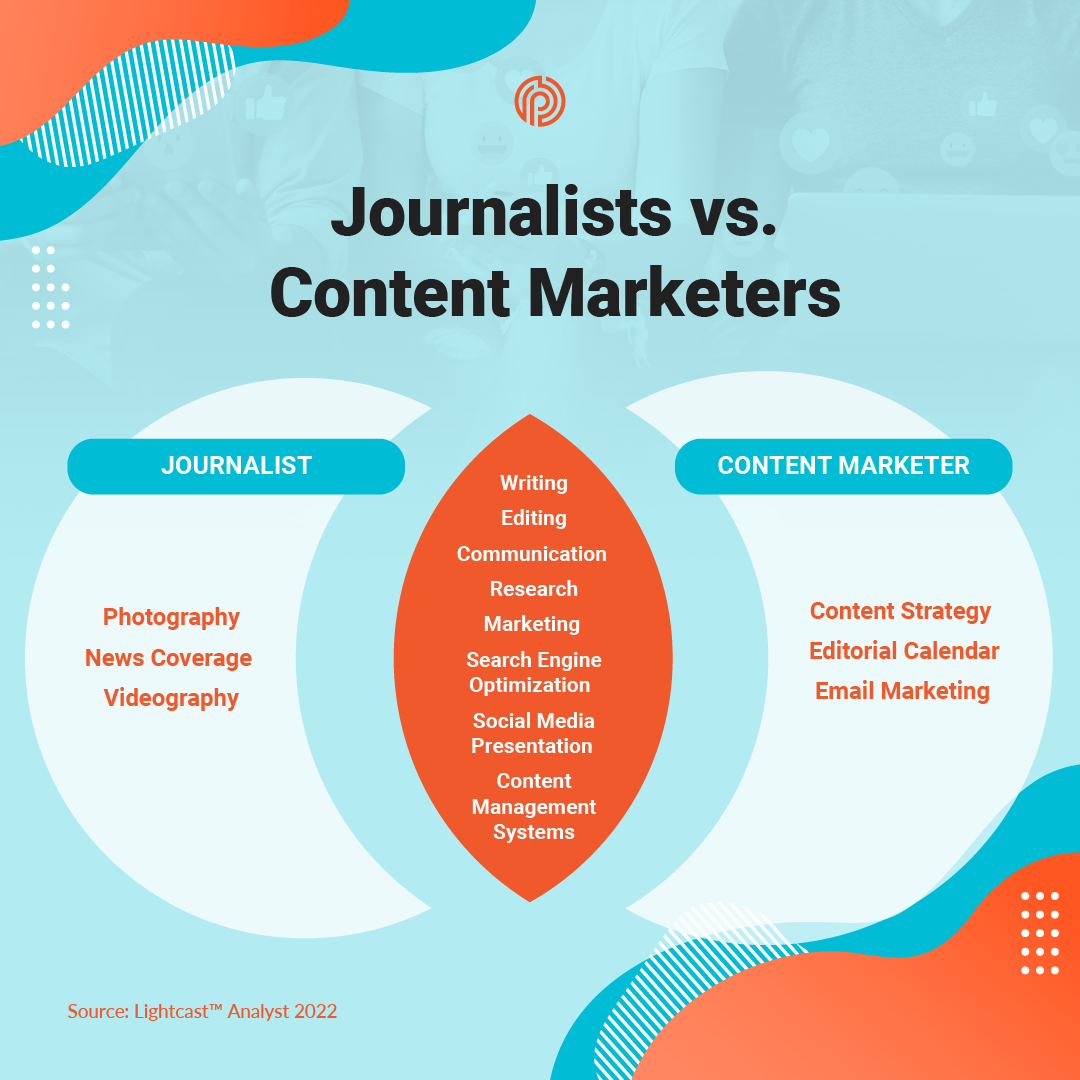Written By:
Kate Gibson
Journalism is an essential part of today’s society. It’s meant to inform the public about current events on both a domestic and international level. Despite this fundamental need to stay informed, however, the field of journalism faces many challenges that have dissuaded professionals from this career path.
According to an article written by the New York Times, over a quarter of newspaper outlets have closed in the United States since 2005. In fact, there were nearly two closures per week occurring nationally prior to the start of the pandemic. At this rate, the US is set up to lose around one-third of its newspapers by 2025.
As a result, current and aspiring journalists are finding themselves at a professional crossroads. If you’re a journalist, or someone with journalism skills, looking to leverage your knowledge in other ways, here’s an overview of:
- Top alternative careers for journalists
- What journalism skills content marketers need
- Why journalists should consider becoming content marketers
Top Alternative Careers that Require Journalism Skills
There are a number of fulfilling careers available to professionals with a journalism background. While some of the most compatible occupations seem like a natural transition, there are plenty of career options that may surprise you.
For example, according to a government report journalism is professionally compatible with the following unexpected positions:
- Broadcast Announcers and Radio Disc Jockeys
- Poets, Lyricists, and Creative Writers
- Private Detectives
- Investigators
- Editors
- Interviewers

Despite the compatibility of these job positions, however, not all of these options offer financial stability or positive job growth. If you’re interested in careers that provide more long-term opportunities, here are the top alternative career paths that require journalism skills.
1. Copywriters
Copywriters are content creators that craft eye-catching copy to encourage, educate, and persuade consumers during varying stages of buying products or services. They create blog posts, product descriptions, marketing emails, advertisements, newsletters, white papers, and social media posts. Copywriters also have a central role in brainstorming and researching communication strategies that focus on targeted audiences.
2. Communications Specialists
Communications specialists typically manage various communication channels within an organization, including newsletters, advertisements, and email marketing. While some focus on internal communications to create consistent company messaging to employees, many work alongside public relations professionals to ensure effective brand awareness.
3. Technical Writers
Technical writers are professional communicators that try to deliver complex information to readers in a digestible way. Some technical documentation they create includes instruction manuals, product descriptions, memos, user manuals, software documentation, and white papers.
4. Communications Managers
Communications managers have a multitude of responsibilities, but they primarily promote a company’s brand, products/services, and mission statement. As a manager, they’re required to collaborate with other high-level executives within an organization to better understand what should be communicated to consumers. Some channels of communication they work with are social media platforms, website content management systems, and press releases.
5. Marketing Coordinators
Marketing coordinators develop and execute strategies focused on increasing sales of a company’s products or services. Since marketing managers work closely with managers of other departments, they play an active role in crafting a company’s messaging. As a result, they need an understanding of industry trends, competition, and the market to effectively act as an intermediary between high-level management and the creative teams within the organization.
6. Proposal Writers
Proposal writers are writing professionals who draft proposal documents for a variety of companies. Even though they focus on proposals, there are several types of documents that they assist in drafting, including sales contracts, business agreements, and grant proposals. This requires researching clients, products, and companies to ensure accurate information and concise messaging.
7. Content Marketers
Content marketers focus on planning and creating valuable content that attracts and converts prospective customers. It’s meant to guide consumers through the process of choosing a product or service to purchase. In order to understand what certain audiences want, content marketers research topics, interview subject matter experts, and explore marketing analytics.

Journalism Skills Every Content Marketer Needs
Content marketing is an excellent career path for professionals with a journalism skill set. If you’re worried you aren’t qualified for a content marketing position, here are some of the top journalism skills that every content marketer needs.
Writing Skills
Writing skills are an obvious journalism competency that overlaps with the world of content marketing. According to Sean Henri, CEO and Founder of Pepperland Marketing, “people who come from a journalism background versus, say, creative writing, tend to more quickly adapt to the type of writing that we do as content marketers.”
Unlike other forms of writing, both journalistic and marketing content requires an understanding of the intended audience. This is accomplished by compiling facts and statistics that add validity to the messaging as well as a subject matter expert to give additional credibility. As a result, many prospective employers require samples of published content before hiring a content marketer. Luckily, individuals with a journalism background typically have an extensive portfolio to share.

Editing Skills
Any career path that requires effective written communication skills also requires substantial experience in editing. Content marketers are expected to be able to self-edit according to clients’ editorial and formatting standards. While their content is often reviewed by others on the team, content marketers are also responsible for editing content authored by other members of the team.
Journalists are usually their own editors, oftentimes reading through their work—and others—against certain standards set by style guides, including the Associated Press and Chicago Manual of Style. Understanding the importance of consistency and formatting is what sets individuals with a journalism background apart from other marketing applicants.
Interpersonal Communication Skills
Both content marketers and journalists interview people. While journalists speak with a wide range of people who play various roles in a current event, content marketers are more likely to speak with experts within a field to add credibility to promotional content they’re creating for their audience.
While these types of interviews are very different, both require exceptional interpersonal communication skills. Prospective employers are always looking for content marketers who are comfortable talking with new people and asking thought-provoking questions. Journalists have real-world experience with this skill, which is often hard to develop with other educational and professional backgrounds.
Research Skills
Journalistic integrity in reporting the facts is another area that overlaps with content marketing. While marketers are always trying to influence consumers to buy a company’s products or services, it’s important to use well-cited facts to provide education to readers, rather than manipulate them on false pretenses.
Research is such an essential part of content marketing that Henri believes “many entry-level content marketers don’t need marketing skills if they’re able to do research.” Those with a journalism background understand the nuances between surface-level and reputable resources, as well as conduct effective research that properly cites sources and experts.
Marketing Skills
While many professionals with a journalism background may doubt their marketing skills, consider how “journalists are always measured by the reach of their content—how many clicks it gets or how widely it’s shared,” says Henri. In a way, journalists are required to take similar steps as content marketers to ensure their material reaches the right audience.
“Many times journalists already have some experience on the promotional side of things, as well as networking. I think that’s something that also makes you a very valuable marketer and could transfer over to your role in content,” says Henri.

Why Journalists Should Consider Content Marketing
There are a number of reasons why journalists should consider making a career change to marketing, but perhaps the most important are the higher earning potential, projected industry growth, and the flexibility it offers.
Salary Potential
While money isn’t everything, most professionals need to consider both current and future earning potential when choosing a career path. According to a government report, journalists earn a median salary of $44,700 per year. This number is similar to the median annual salary earned in the United States, which is $44,225. In comparison, according to a government report content marketers earn a median salary of $56,000 per year. As a result, marketing seems to be the more lucrative and financially stable career path that offers more earning potential in the future.
Job Growth
Projected job growth is an incredibly important factor when choosing a career path. While every industry has amazing opportunities, job security is often dependent on the market demand for any given profession.
.png?width=1080&height=1080&name=1470650_PepperlandMarketing-JobGrowthComparison-option2_101022%20(1).png)
According to the U.S. Bureau of Labor Statistics (BLS), journalism is projected to experience a significant decline of nine percent in its career outlook from 2020–2030. On the other hand, marketing professionals are experiencing a more positive career outlook, projected to grow around six percent in the next decade. While this shouldn’t be the sole deciding factor for those looking for a career change, it’s comforting to know that marketing professionals will have an easier time finding employment in the coming years.
Flexibility
Ever since the transition to hybrid and remote work during the pandemic, workers want more flexibility and freedom in their schedule. Since “the news never sleeps,” it’s not surprising that many professionals in journalism are feeling burnout because of the demands of reporting on events before anyone else.
Content marketing is far more flexible in both scheduling and location. Many marketing agencies, like Pepperland Marketing, have made the commitment to go fully remote and adopt a more individualized approach to work schedules.
Take Your First Step Toward a Career as a Content Marketer
Pursuing a career outside your industry or educational background can be a daunting feat, but it doesn’t have to be. Most journalism professionals have the right skills and experience to quickly acclimate to the marketing world. In fact, many employers search for professionals with this exact skill set.
At Pepperland, we’re always looking for individuals with a diverse professional and educational background. If becoming a content marketing specialist is something you're interested in, consider taking a look at our career opportunities to see if there's a role that fits your skills and interests!








